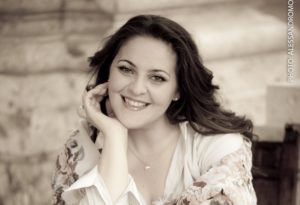
Q&A: Maria Agresta Talks Verdi, The Royal Opera House’s ‘Otello’ & Her Upcoming ‘Il Trovatore’ At The Met
By Francisco SalazarMaria Agresta has quickly risen to fame in the opera world. She has made debuts in all the great theaters including the Metropolitan Opera, Teatro alla Scala, and Royal Opera House. She has also become the go-to soprano for the Verdi repertoire singing roles in “I Due Foscari,” “Il Trovatore,” “I Masnadieri,” “La Traviata” and “Simon Boccanegra.”
This month she returns to the Royal Opera House for the highly anticipated production of Verdi’s “Otello,” a role she has performed numerous times, that will see her working with Jonas Kaufmann and Antonio Pappano. She will also debut “Luisa Miller” at the Zürich Opera and returns to the Metropolitan Opera in the winter for “Il Trovatore.”
Agresta spoke to OperaWire about singing Verdi and her upcoming roles in the composer’s canon.
OperaWire: What are the challenges of singing Verdi?
Maria Agresta: I don’t think Verdi is difficult to sing, compared to other composers. Each composer has its own peculiarity, and who is singing should have a different approach when performing the character and his hints, even if the singing technique remains the same.
OW: How is singing Verdi different from singing other composers?
MA: Verdi is a passionate composer. His characters are always represented in a certain way, the “extreme.” For example, the cruel Jago, jealous Otello, pure Desdemona.. but also crooked Rigoletto, conformist Germont, vindictive Azucena. The greatest danger of all is to be overpowered by the emotions. In Verdi’s music, there is a great formal accuracy, a “dryness” which has its own origins in Italian polyphony, from Palestrina’s music to Monteverdi. It’s always a fascinating challenge to know how to rely on what Verdi wrote, without creating or adding anything new, in order to recreate the character how he wanted it to be. And Verdi was so meticulous! Besides his scores, he left us so many detailed documents which explain each detail in the scene!
OW: A lot of people point toward the bel canto composers as a great way to prepare for singing Verdi. What are your thoughts on this?
MA: I agree completely. Bellini and Donizetti are great Maestri in that way.
OW: What was your first exposure to Verdi’s operas?
MA: The first Verdi opera which I studied and sang was “Il Trovatore,” but before this, I also studied his chamber romances.
OW: What is your favorite Verdi opera?
MA: Each time I think about this, I can’t choose one. I deeply love “La Traviata,” I adore “Il Trovatore,” can’t stop listening to “Simon Boccanegra,” “Don Carlo” and if I think about Verdi’s first operas, I cannot exclude “I Masnadieri” or “Oberto Conte di San Bonifacio.” By the way, I believe that if someone were to ask me which opera I could not do without, that would be “Otello.”
OW: Speaking of “Otello,” Desdemona is often seen as a weak woman. How do you do away with those stereotypical views?
MA: This is absolutely not like this. Desdemona is not a weak woman. She is in love, in love with love itself, an innocent pure woman who doesn’t know the danger which comes from the human wickedness. Verdi said Desdemona “is not a woman, she is a kind.”
OW: What is your favorite moment to sing in “Otello?”
MA: I adore the duet during the third act with Otello and also the act IV scene which ends in the beautiful and painful “Ave Maria.”
OW: What is the most challenging moment in the opera?
MA: I believe it’s all very challenging, but looking at the whole opera, I think that concertato during Act III is a very delicate moment. All characters are on the scene and the chorus, and among all this quantity of sound there is Desdemona singing, in a sweet way, of “elegant pain.”
OW: You’re doing “Il Trovatore” and “Luisa Miller” afterward. What is it like to go back to early Verdi and do you think singing Desdemona is similar to these two earlier works?
MA: I have sung “Trovatore” many times, while Luisa Miller will be an absolute debut. Verdi’s style is always very clear, but Desdemona has a different language from the other 2 heroines.
OW: Which character of the three Verdi roles you’ll be portraying do you identify most with?
MA: I have surely something of all three: a sense of sacrifice, the capacity to love in the most absolute way and a sense of responsibility.
OW: Which role do you find most challenging?
MA: I am not sure yet, but I think among the three we are talking about, this would be surely Luisa Miller.
OW: What excites you about bringing Leonora to the Metropolitan Opera?
MA: I am thrilled to know I can sing this wonderful role in another wonderful and great Theater, under the baton of one of the greatest conductors of all times, James Levine. I have already sung this role at La Scala, at the Royal Opera House, at the Teatro Reina Sofia di Valencia, with [Zubin] Mehta, and now this is another beautiful dream come true.
OW: Of the Verdi roles you have not sung, which do you really want to do and why?
MA: I have never sung Lady Macbeth, and I don’t know if I could ever sing it. But it fascinates me because I believe that, besides having a solid technique to sing it, one should be a real great interpreter.


